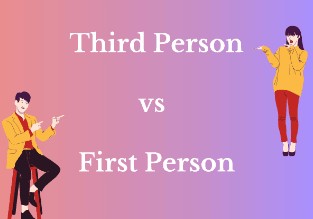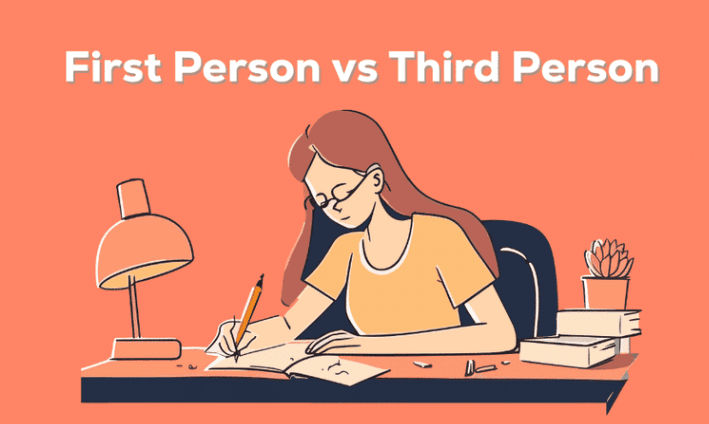Mastering Third Person vs First Person: An English Learner’s Guide
Contents

Welcome to a new chapter in your English learning journey in which we will discuss an interesting aspect of the language: "Third Person vs First Person". Grasping this concept is key to improving both your spoken and written English skills.
Mastering the use of first and third person can significantly enhance your spoken and written English skills, making your communication clearer and more impactful. This blog post will guide you step by step through practical advice, relatable examples, and effective strategies to navigate this aspect of the English language with confidence. Whether it's writing an email at work or choosing between 'third person vs first person' in an English speech – we've got you covered. So let’s start!
What are First Person and Third Person Perspectives?
First-person perspective uses first-person pronouns like 'I', 'me', and 'we'. It's like you’re on a personal phone call to your friend, sharing your experiences. Sentences like "I love idlis for breakfast" or "We went to the new mall last weekend" use the first-person perspective. You're the main narrator of your own story.
On the other hand, the third-person perspective involves third-person pronouns such as 'he', 'she', 'it', or 'they'. It’s as if you're an onlooker describing the actions that you see. Examples include "She cooks delicious biryani" or "They watched the latest episode of their favourite show". Here, you are narrating someone else’s story.
When to Use Third-Person vs First-Person?
First Person | More personal | I/me/my/we/us/our |
Third Person | More objective | he/him/his/she/her/it/its/they/them/their |
The first person might be more suitable in casual conversations or personal essays where you're sharing experiences. It is suitable when expressing your feelings or recounting your personal experiences. For instance, during a job interview, you might say, "I supervised this project."
In contrast, the third-person works better for formal writing or when describing others' actions. Think of reporting an incident at work or writing unbiased reviews about a restaurant. This perspective works better when discussing others or presenting facts. In a project report, you'd hear, "They worked really hard on this project."
Think of it in relation to the third-person vs first-person in PUBG (PlayerUnknown's Battlegrounds), the popular mobile game. While the third-person view provides a wider view of the game world, the first-person view provides a more immersive experience of person experience. The perspectives work similarly in the English language as well.
Common Mistakes in Using First & Third Person

One common error with first-person usage is the incorrect form of pronouns, such as "me and my friend" instead of "my friend and I". Non-native speakers often misuse first-person pronouns unintentionally. Instead of saying, “Me and my friend went shopping,” it should be “My friend and I went shopping.” Remember to never use the first person pronoun "me" at the beginning of any sentence.
With third-person pronouns, learners often mix up 'his' and 'he's'. Remember, 'he's' is a contraction of 'he is' or 'he has'. Similarly, with third-person usage, it's common to confuse singular and plural forms. Correct usage is “He has his books” and "They have their books." Saying "He have his books" or "They has their books" is wrong.
Transitioning smoothly between the first-person and third-person perspectives is also crucial. Here's a tip: always consider who you are talking about – yourself (first person) or someone else (third person). Practice this by writing a narrative where you describe what you did in a day (first person), followed by explaining someone else’s actions (third person).
For example:
"This morning, I woke up early and decided to go for a run. Meanwhile, my neighbour Preeti was still fast asleep. She finally woke up when I was stretching after my run."
Remember these tips as you practice switching between first and third-person perspectives. You'll soon master them!
Building Your Vocabulary in First & Third Person
A robust vocabulary is crucial when using different narratives and perspectives. Enriching your vocabulary with diverse words and phrases that help you express third-person vs first-person perspectives can elevate your communication, making it more fluent and engaging. Browse through these 100+ Daily Use English Words for Fluent Communication to boost your day-to-day interactions.
Let's consider a quick exercise: Convert the following first-person sentences into third-person.
1. "I enjoy reading books on history."
2. "I am planning to visit the library tomorrow."
Using the third-person pronouns, these sentences can be converted as:
1. "He enjoys reading books on history."
2. "She is planning to visit the library tomorrow."
Now, practice this switch with sentences from your daily conversations! This repeated practice will help you comprehend the usage of perspectives while writing in third-person vs first-person and train your mind to use them properly, enhancing your fluency in spoken English. Remember, language mastery is all about practice!
Wrapping Up
In our discussion on third-person vs first-person writing and usage, we've covered some important ground. Remember, the choice between these two perspectives can drastically impact the tone and interpretation of your communication. Practising and understanding their usage in varied contexts is crucial to improving your language skills.
If you wish to master the English language better, Clapingo can aid you further. With personalised coaching that includes dealing with issues like third-person vs first-person usage, Clapingo is an ideal partner for those aspiring to master the English language.
Remember, no journey to English mastery happens overnight. It's a process that requires consistent effort and practice. Take comfort in knowing that with patience and practice, you will master this beautiful language. Don't be afraid of making mistakes; they're stepping stones on your language-learning journey.
FAQs
1. What are some third-person pronouns?
Third-person pronouns include he, she, it (singular) and they (plural).
2. Do people prefer third-person or first-person shooting games?
This largely depends on personal preference. Some players find the first-person perspective more immersive, while others prefer the wider field of view provided by third-person games.
3. Is third-person or first-person writing more appealing?
Both perspectives have their merits depending on the context. In academic or formal writing, the third person is usually preferred for its objective stance. Yet, first-person writing can provide a direct and intimate connection with readers.
Comments
Your comment has been submitted